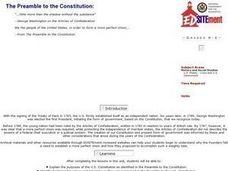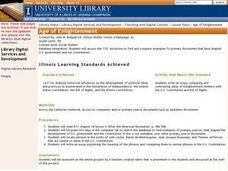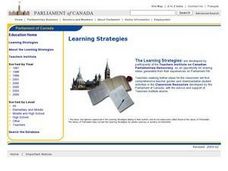Curated OER
Sioux Treaty of 1868
Students explore and research the history of Native Americans in North America.
Curated OER
Photographs of Lewis Hine: Documentation of Child Labor
Learners use the Archival Research Catalog to complete assignments and activities about Lewis Hines and the National Child Labor Committee.
Curated OER
Sow the Seeds of Victory!
Pupils use the National Archives and Records Administration's records to research the history of the U.S. Food Administation.
Curated OER
Constitutional Issues: Separation of Powers
Young scholars discribe the principle and the history of separation of powers.
Curated OER
D-Day Message from General Eisenhower to General Marshall
Students use documents in the National Archives of the United States to evaluate the effectiveness of D-Day.
Curated OER
Memorandum Regarding the
Students use the National Archives to research the memorandum regarding the enlistment of Navajo Indians during World War II.
Curated OER
Telegram from Senator Joseph McCarthy to President Harry S. Truman
Students research Senator Joseph McCarthy's February 9, 1950 speech, given at Wheeling, West Virginia, in which he claimed more than 200 State Department employees were members of the Communist Party.
Curated OER
Memorandum of a Conference with President Eisenhower after Sputnik
Students use the National Archives to research how the United States and the Soviet Union south to maintain its supremacy after World War II.
Curated OER
A World At Peace
Learners view a film segment and identify examples of world conflict. They examine why groups fight for control of land or natural resources. They discover ways in which conflict can be avoided.
Curated OER
The Preamble to the Constitution
Students discuss key phrases from the Preamble of the Constitution, find ways to relate the values stated in the Preamble to their daily lives, and explore possible changes needed in the Constitution by future generations of citizens.
Curated OER
Women's Right To Vote
Fifth graders explore the history of women's right to vote and identify two of the leaders of the suffrage movement, Alice Paul and Lucy Burns. After completing readings and discussions, they write an article for the newspaper about...
Curated OER
Constitutional Convention
Students engage in a role-playing situation to illustrate the kinds of compromised that were made a teh Constitutional Convention. They write three short 1-2 paragraph arguments and then present their arguments to the class at the...
Curated OER
Faces Behind the Guns
Young scholars use the New York Times article profiling ordinary citizens who legally own guns as the basis of a role-playing exercise in which they explore the types of people who own firearms and their personal reasons for doing so.
Curated OER
Founding Myths, Stories that Hide Our Patriotic Past
Learners participate in a scavenger hunt using their textbooks to find information about historical events, people and places in US history during the Revolutionary Era. After creating their list of important people, students create...
Curated OER
Age of Enlightenment
Studnets compare example of primary documents that have shaped U.S. government and our Constitution.
Curated OER
Should the U.S. Say Sorry?
Eighth graders research "reparations," by examineing the institution of slavery, racial and economic discrimination against African-Americans, and the impact of these forces on living African-Americans, to make recommendations to the...
Visa
Credit Cards
Choosing your first credit card can often be an intimidating and confusing experience for young adults. Give your pupils the foundational knowledge they need for tackling this process head-on, including learning to distinguish different...
Curated OER
The Kansas-Nebraska Act of 1854: Popular Sovereignty and the Political Polarization over Slavery
Why did Stephen Douglas support the Kansas-Nebraska Act of 1854? Why did Abraham Lincoln oppose it? Young historians examine how the Kansas-Nebraska Act of 1854 affected the political balance between free and slave states and explore how...
iCivics
Separation of Powers
In a fun and informative simulation, your learners will act in groups as lead chefs, menu writers, and nutrition inspectors in deciding a new school lunch menu. They will then compare and contrast their experience to the interaction...
Curated OER
Who Am I? (Middle School)
Third graders complete a classroom game used to build understanding of two and three-dimensional shapes. Diagonals, sides, regularity, congruency, angle measurements, parallels, perpendicular, faces, and edges are a few of the vocabulary...
Curated OER
Multiculturalism and Immigration
Tenth graders determine how a refugee is different from a migrant. They explain how there are various classifications of refugee claimants and gain an overview of Canada's refugee determination system.
Curated OER
Carousel on Democracy
Fifth graders examine the municipal, provincial, federal levels of government. They study the process of making a presentation to a level of government.
Curated OER
Model Parliaments: Creating a Real Senate
Students discover how the Canadian Parliamentary works and how to tolerate other people's point of view by participating in a model Parliament.
Curated OER
America¿s Leader
Students examine the roles and responsibilities of the President of the United States. Using their textbook, they discover when the presidency was formed, how it works and what kind of power the President has. They also discuss how the...

























